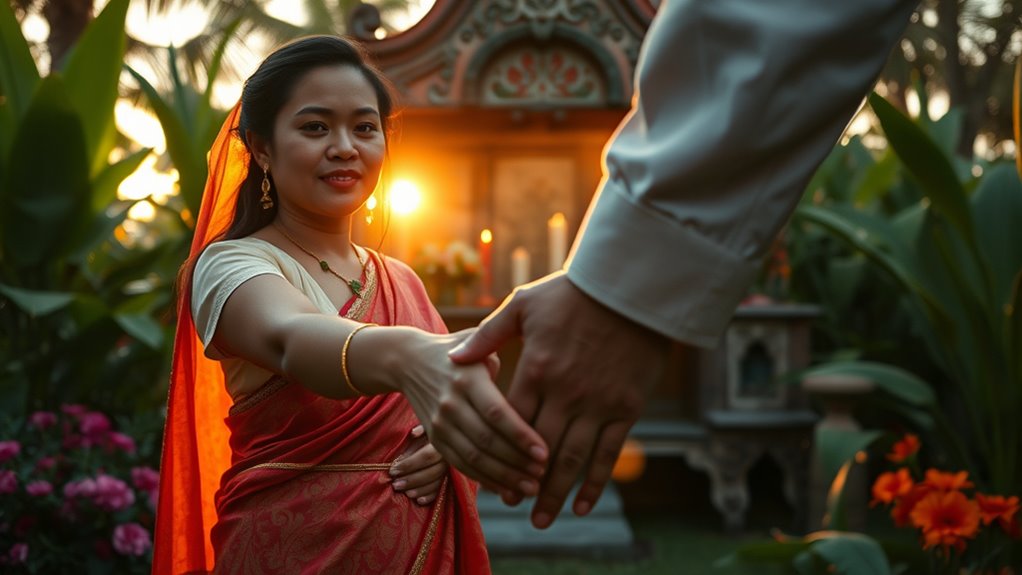Filipina women value partners who honor ancestors because it shows a commitment to cultural heritage and family ties. This respect for elders and traditions fosters strong, supportive relationships built on shared values. When a partner acknowledges ancestral practices, it signifies loyalty and a deeper understanding of the legacy they carry. Such connections strengthen family bonds and uphold the values essential for a harmonious life together. Discover how this connection shapes relationships further.
Key Takeaways
- Filipina women appreciate partners who honor ancestors as it reflects respect for family and cultural heritage.
- Valuing ancestral traditions fosters connection and strengthens familial bonds, which is crucial in Filipino culture.
- A partner’s reverence for ancestors signifies loyalty, an essential trait in meaningful relationships.
- Upholding ancestral practices demonstrates a commitment to intergenerational harmony and collective identity.
- Respect for ancestors aligns with the Filipino value of *utang na loob*, enhancing relationship dynamics through mutual appreciation.
Historical Significance of Women in Filipino Culture
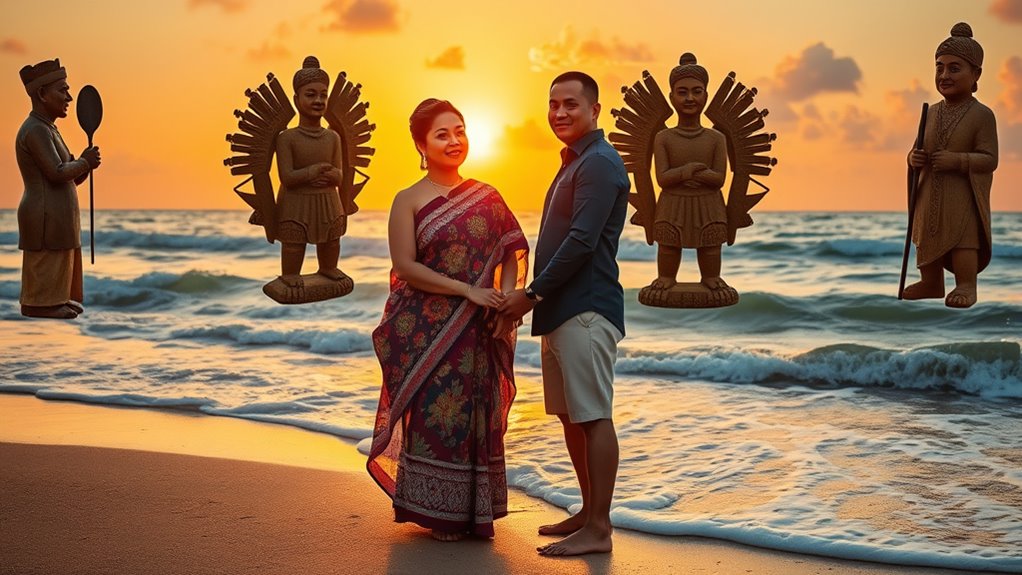
Although many people may not realize it, women have played a crucial role in shaping Filipino culture throughout history. Before colonial rule, you’d find that women enjoyed equal status in a bilateral kinship system, owning property and engaging in trade.
They often held significant spiritual roles, serving as medicine women or astrologers, influencing their communities greatly. Women like Melchora Aquino and Pura Villanueva Kalaw emerged as powerful figures, leading social reforms and embodying strength.
They not only contributed to political movements but also nurtured cultural traditions essential for the next generations. Their leadership and community involvement highlight the historical significance of women in Filipino society, showcasing resilience and empowerment that continue to inspire today.
The Impact of Colonialism on Gender Roles
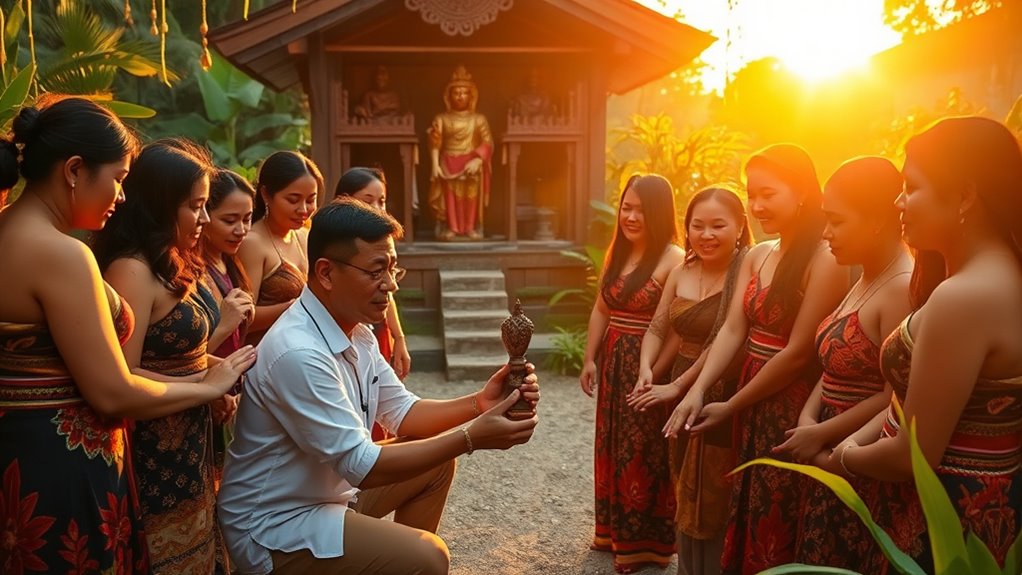
The role of women in Filipino culture underwent significant transformations due to colonialism, altering their status from one of relative equality to subservience.
Spanish colonialism introduced a patriarchal system, idealizing women as meek and timid while diminishing their authority in spiritual matters. Before colonial rule, women managed finances and owned property, but their roles shifted to domestic duties, limiting economic independence.
As you observe, women’s social status became tied to their relationships with men, reinforcing stereotypes of passivity.
American colonialism further entrenched these gender norms, using women to symbolize peace while promoting Western educational ideals.
Even today, remnants of these colonial influences persist, complicating modern gender dynamics in the Philippines as women endeavor for equality and recognition.
Modern Family Values and Ancestral Respect
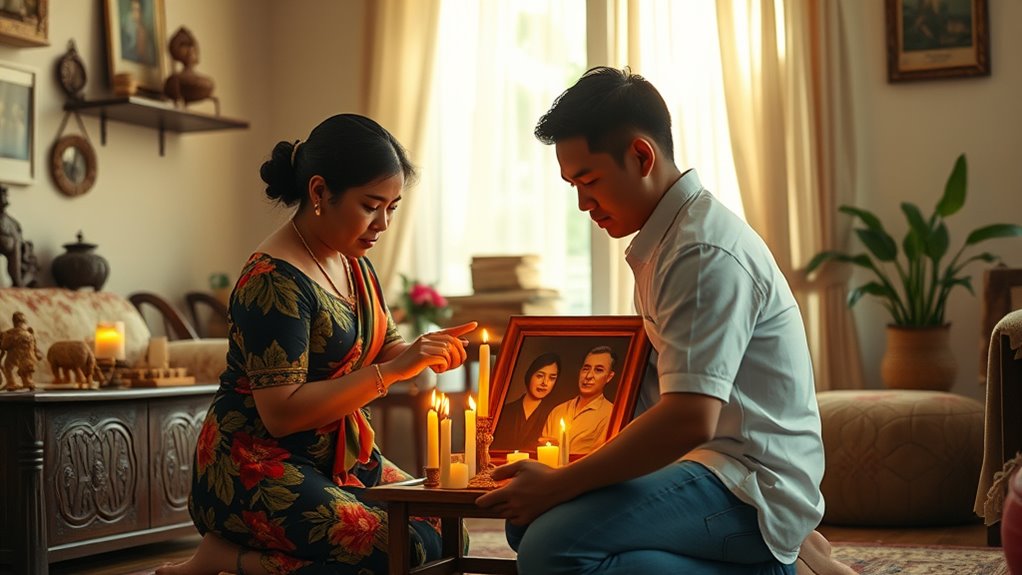
As modern Filipino families navigate the complexities of contemporary life, they often blend traditional values with evolving societal norms. Education stands out as a key focus, reflecting a commitment to success while honoring cultural roots.
Modern Filipino families harmonize traditional values with contemporary challenges, prioritizing education while honoring their cultural heritage.
You’ll notice that respect for elders remains central, fostering harmony and strengthening family cohesion. Families adapt to modern times by integrating technology, allowing them to maintain connections while preserving ancestral customs. This balance helps guarantee that cultural identity thrives amid global influences. You may see intergenerational support as families care for aging parents, embodying the value of *utang na loob*. Moreover, caregivers play a crucial role in ensuring that financial considerations for elderly care are addressed, helping to uphold the dignity and respect that elders deserve.
Ultimately, these modern family values reinforce the importance of ancestral respect, creating a foundation for strong, resilient family bonds.
Ancestral Honoring Practices in Filipino Tradition
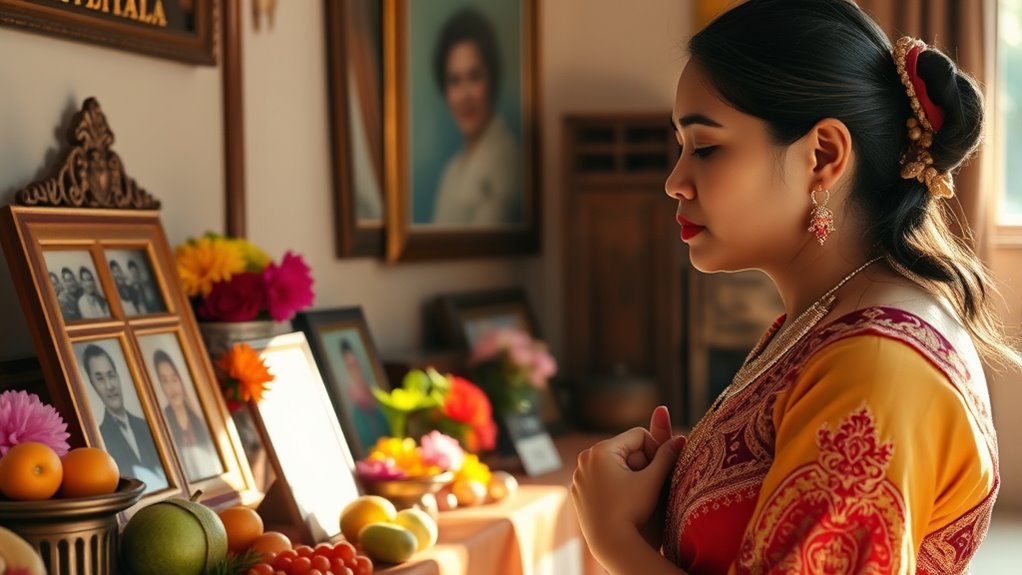
In Filipino tradition, honoring ancestors is an essential practice that connects families and communities across generations. You’ll find that ancestral spirits, or “anito,” play a significant role, guiding the living and promoting communal harmony.
Rituals often include food offerings, where you show respect and seek blessings for your family. Communal gatherings reinforce cultural heritage and strengthen ties, while symbolic items celebrate life cycles.
During wakes, practices like *atang* offerings reflect deep respect for the deceased. Events like Undas unite generations in honoring ancestors, with cemetery visits and shared rituals.
Expectations for Partners in Upholding Cultural Values
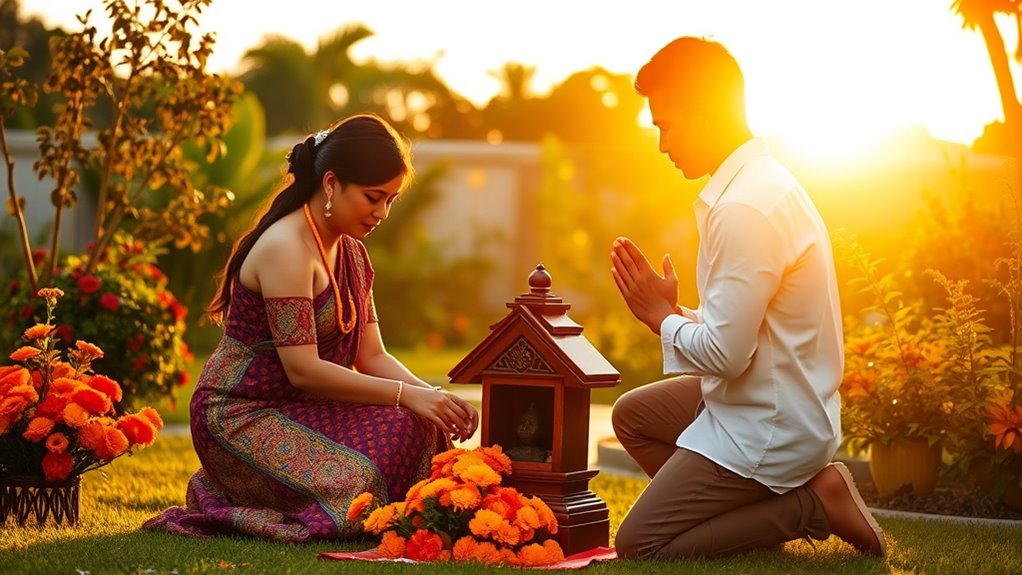
Upholding cultural values in relationships often means embracing respect, loyalty, and family involvement. You’re expected to show respect not just to your partner, but also to their family and traditions. This includes valuing elders and honoring cultural practices.
Partners must adapt to family-centered values, often seeking approval for significant life decisions. Communication plays an essential role; indirect styles and nonverbal cues are important to maintaining harmony and avoiding conflict.
Long-term commitment is significant, as stability is deeply ingrained in Filipino culture. You should support each other through challenges, viewing marriage as a sacred bond.
The Societal Benefits of Honoring Ancestors Together
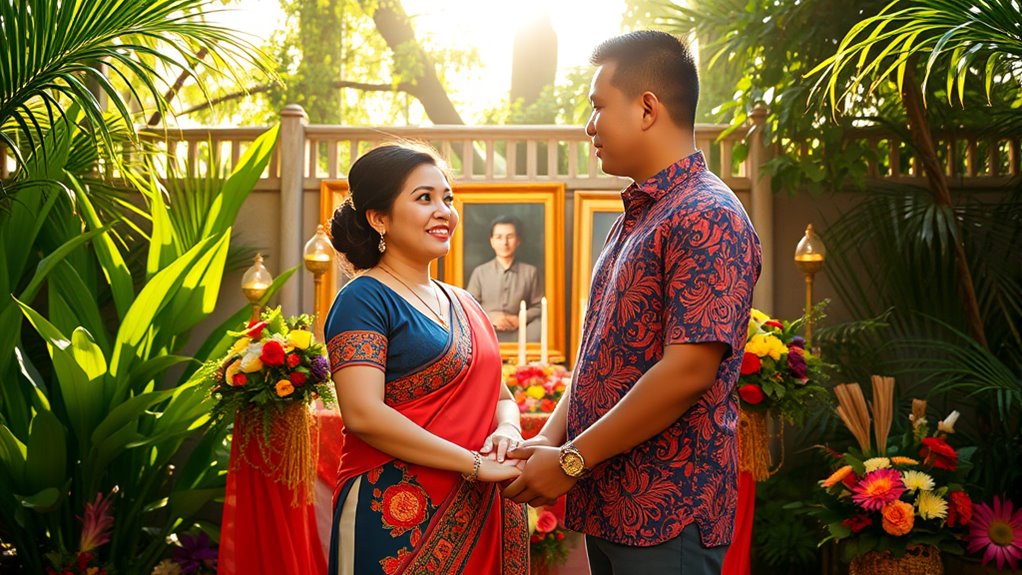
Honoring ancestors together fosters deep societal benefits that extend beyond individual relationships. It strengthens family ties, creating unity within communities while preserving cultural traditions. When you participate in celebrations centered on ancestors, you engage in community events that foster social harmony and a shared identity. This practice also promotes intergenerational respect, ensuring that values and ethics are passed down. By appreciating cultural heritage, you enhance your sense of belonging and contribute to cultural resilience. Additionally, honoring ancestors educates younger generations about their history, enriching their understanding of customs. Moreover, the importance of legal representation during family transitions can help ensure that these cultural practices are maintained and respected during challenging times. Furthermore, these shared experiences can also lead to increased investment in local cultural initiatives, enhancing community ties and support networks. Ultimately, these shared experiences provide emotional support, promote well-being, and even boost local economies through cultural tourism and small businesses. Together, you create a stronger, more connected society.
Frequently Asked Questions
How Can Honoring Ancestors Strengthen Modern Relationships?
Honoring ancestors can considerably strengthen modern relationships by fostering trust and respect between partners.
When you acknowledge your heritage, it cultivates shared values and emotional support, enhancing your bond. This practice also teaches valuable conflict resolution skills, helping you navigate disagreements with grace.
Ultimately, honoring your roots emphasizes long-term commitment, making your relationship more resilient.
What Are Common Ancestral Honoring Rituals in Filipino Households?
In Filipino households, common ancestral honoring rituals include offering food and symbolic items during family gatherings.
You might see communal ceremonies where everyone shares stories about ancestors, reinforcing family bonds.
During funerals, practices like placing personal belongings in coffins and scattering rice grains are observed to honor the deceased.
You may also witness the “sukal” ritual, where children are passed over coffins, symbolizing protection from further loss in the family.
Do All Filipina Women Prioritize Ancestral Honoring in Partners?
Not all Filipina women prioritize ancestral honoring in their partners. You’ll find that individual beliefs and cultural backgrounds play a significant role in this preference.
Some may embrace modern values or have different family influences that shape their views on tradition. Others might strongly value ancestors’ significance and seek partners who share that perspective.
Ultimately, it’s essential to recognize the diversity in values and priorities among Filipina women regarding ancestral honoring.
How Does Ancestor Honoring Affect Children’s Cultural Identity?
Imagine planting a seed that blossoms into a vibrant tree, rooted deep in your heritage.
Honoring ancestors shapes your cultural identity by weaving stories and traditions into your very being. It fills you with pride, connecting you to the past and guiding your future.
As you learn from those who came before, you cultivate respect for your roots, enriching your understanding of self and nurturing a strong sense of belonging within your community.
Are There Regional Differences in Ancestral Honoring Practices Among Filipinos?
Yes, there are significant regional differences in ancestral honoring practices among Filipinos.
In Tawi-Tawi, the Sama people celebrate Pagkamboan, while other ethnolinguistic groups have their unique rituals and offerings.
You might find communal feasts and purification rites varying from one region to another, reflecting local mythology and folklore.
These practices not only enrich cultural identity but also strengthen community bonds, showcasing the diversity of ancestral reverence across the Philippines.
Conclusion
In the grand tapestry of Filipino culture, honoring ancestors isn’t just a nice gesture—it’s practically a superpower! When you embrace this tradition, you’re not just winning the heart of a Filipina woman; you’re revealing a treasure chest of love, respect, and family unity. Imagine the joy of sitting around a table, sharing stories of ancestors, and feeling like you’ve stepped into a vibrant, living history. So, if you want to sweep her off her feet, don’t forget to honor the past!
